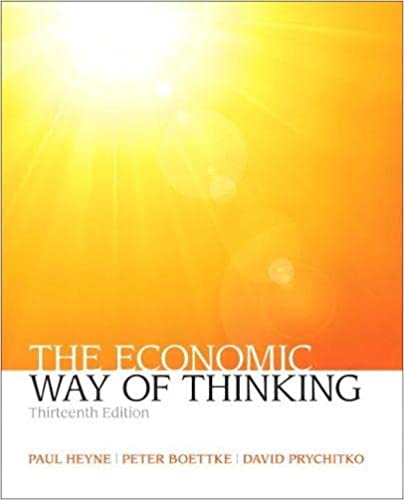
The Economic Way of Thinking 13th Edition by David Prychitko, Peter Boettke, Paul Heyne
Edition 13ISBN: 9780132992695
The Economic Way of Thinking 13th Edition by David Prychitko, Peter Boettke, Paul Heyne
Edition 13ISBN: 9780132992695 Exercise 7
Cartels tend to break down in the absence of support from a government that is willing and able to penalize cartel members who violate the cartel's agreements. Why? Isn't it in the interest of each cartel member to abide by any agreement that aims at maximizing the net revenue of the cartel? Why would the members have to be compelled by government to adhere to the agreement? One way to see why cartels break down is to ask yourself what would happen if four people played the following game.
Each player holds two cards, one marked L and the other S. When a signal is given, the players simultaneously play one or the other of their cards and are then awarded monetary prizes that vary according to the pattern of cards played.
If the pattern is 4 S cards, each player receives $5.
If the pattern is 3 S cards and 1 L card, those who played S lose $5 and the player who played L wins $15.
If the pattern is 2 S cards and 2 L cards, those who played S lose $10 and those who played L win $10.
If the pattern is 1 S and 3 L, the player who played S loses $5 and those who played L win $5.
If all play the L card, all lose $5.
(a) What do you think will occur, assuming that each player acts freely and independently and tries to maximize his or her winnings?
(b) Why will it be difficult for the players to avoid losing rather than winning money in the absence of an "enforcer" who punishes anyone who plays the L card?
(c) Now suppose that the four "players" are actually four independent producers that dominate an industry, and that "playing the L card" means deciding to produce a large quantity of output, while "playing the S card" means deciding to produce a small quantity of output. Look again at the payoffs. Think of them now as the profits that would accrue to the producers depending on (i) whether they individually decided to restrict their output for the sake of a higher price and (ii) what the other producers decided. Why does a producer always make a larger profit by choosing a large output, regardless of what others choose?
(d) What procedures might be available to the members of the industry that would induce every producer in the industry to choose the small output and thus maximize the profit accruing to the industry as a whole?
Each player holds two cards, one marked L and the other S. When a signal is given, the players simultaneously play one or the other of their cards and are then awarded monetary prizes that vary according to the pattern of cards played.
If the pattern is 4 S cards, each player receives $5.
If the pattern is 3 S cards and 1 L card, those who played S lose $5 and the player who played L wins $15.
If the pattern is 2 S cards and 2 L cards, those who played S lose $10 and those who played L win $10.
If the pattern is 1 S and 3 L, the player who played S loses $5 and those who played L win $5.
If all play the L card, all lose $5.
(a) What do you think will occur, assuming that each player acts freely and independently and tries to maximize his or her winnings?
(b) Why will it be difficult for the players to avoid losing rather than winning money in the absence of an "enforcer" who punishes anyone who plays the L card?
(c) Now suppose that the four "players" are actually four independent producers that dominate an industry, and that "playing the L card" means deciding to produce a large quantity of output, while "playing the S card" means deciding to produce a small quantity of output. Look again at the payoffs. Think of them now as the profits that would accrue to the producers depending on (i) whether they individually decided to restrict their output for the sake of a higher price and (ii) what the other producers decided. Why does a producer always make a larger profit by choosing a large output, regardless of what others choose?
(d) What procedures might be available to the members of the industry that would induce every producer in the industry to choose the small output and thus maximize the profit accruing to the industry as a whole?
Explanation
Cartels tend to break down in the absenc...
The Economic Way of Thinking 13th Edition by David Prychitko, Peter Boettke, Paul Heyne
Why don’t you like this exercise?
Other Minimum 8 character and maximum 255 character
Character 255


